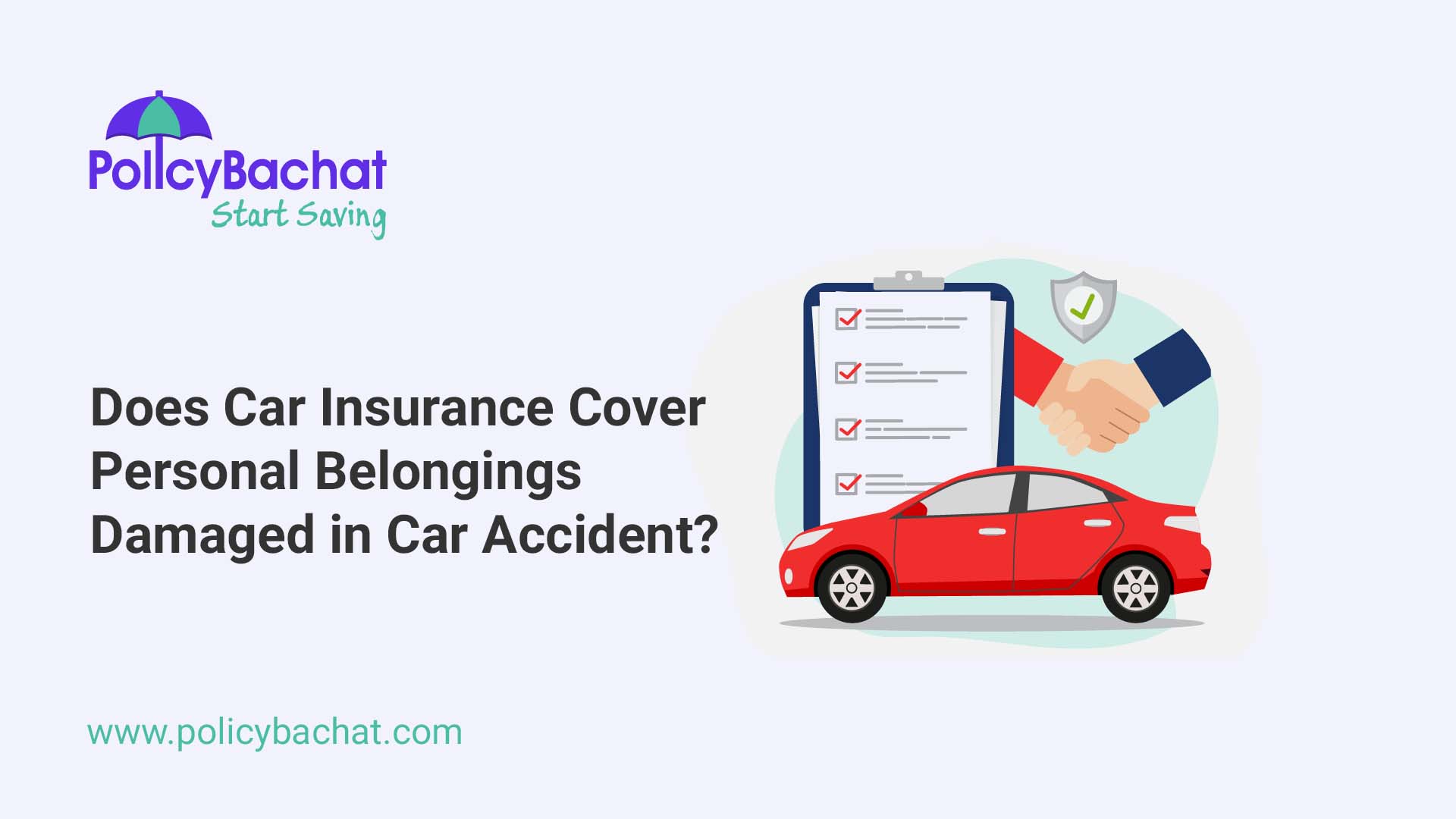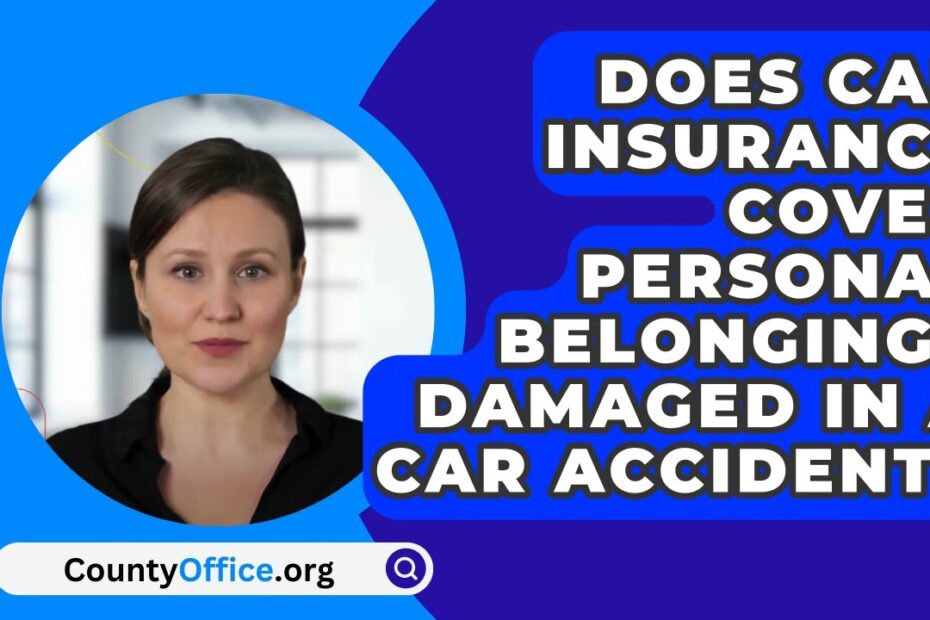No, car insurance typically does not cover personal belongings damaged in a car accident.

Credit: www.policybachat.com
What Is Covered?
Car insurance generally does not cover personal belongings damaged in a car accident. Most policies focus on covering damage to the vehicle itself rather than personal items inside.
Understanding Car Insurance Coverage
When it comes to car insurance, understanding what is covered and what is not can be confusing. One common question that often arises is whether car insurance covers personal belongings that are damaged in a car accident. Let’s delve deeper into this topic to understand what is covered under car insurance policies.Physical Damage Coverage
Physical damage coverage is an essential component of car insurance policies. It provides financial protection in case your car is damaged due to a collision or non-collision incident. There are two main types of physical damage coverage: collision and comprehensive. Collision coverage protects your vehicle in the event of a collision with another vehicle or object, such as a tree, rock, guardrail, or building. On the other hand, comprehensive coverage covers damage to your car caused by non-collision incidents, such as theft, vandalism, fire, or natural disasters. While physical damage coverage typically applies to the vehicle itself, it generally does not extend to personal belongings inside the car. So, if your laptop, phone, or other belongings get damaged in an accident, they may not be covered under the physical damage coverage of your car insurance policy.Property Damage Liability
Property damage liability coverage is another important aspect of car insurance that comes into play when you cause damage to someone else’s property in an accident. This coverage applies to damage caused to other vehicles, buildings, structures like fences or telephone poles, and even legal fees if you are sued for the same types of damage. However, it’s crucial to note that property damage liability does not cover damage to your own personal belongings. It is specifically designed to protect you financially when you damage someone else’s property, not your own. In conclusion, when it comes to car insurance, it’s essential to have a clear understanding of what is covered. While car insurance policies provide physical damage coverage for your vehicle and property damage liability coverage for third-party property damage, they generally do not cover personal belongings damaged in a car accident. To ensure the protection of your personal belongings, it’s advisable to consider separate insurance options such as renters or homeowners insurance that specifically cover personal belongings.Exclusions
Car insurance typically does not cover personal belongings that are damaged in a car accident. It is important to check your policy for any exclusions regarding personal property and explore separate coverage options if necessary.
Personal Belongings Exclusion
When it comes to car insurance coverage, it’s important to understand the exclusions that may apply. One of the most common exclusions is the coverage for personal belongings damaged in a car accident.
Insurers typically exclude coverage for personal belongings that are inside the car at the time of the accident. This means that if your laptop, phone, or any other personal item gets damaged or stolen during a car accident, your car insurance policy may not cover the cost of repairing or replacing those items.
It’s worth noting that this exclusion applies even if the personal belongings are damaged due to the accident itself. Car insurance policies are primarily designed to cover the cost of repairing or replacing the vehicle, not the personal belongings inside it.
Replacement Costs Exclusion
Another important exclusion to be aware of is the replacement costs exclusion. This exclusion means that your car insurance policy may only cover the actual cash value (ACV) of the damaged personal belongings, rather than the cost of replacing them with new items.
For example, if your laptop gets stolen during a car accident and it was six years old, the insurer may only reimburse you for the value of a six-year-old laptop, which may be significantly less than the cost of a brand-new laptop.
It’s important to review your car insurance policy to understand the specific exclusions and limitations that may apply to personal belongings damaged in a car accident. If you have valuable items that you regularly carry in your car, such as electronics or jewelry, you may want to consider purchasing a separate insurance policy to protect those items.
Options For Coverage
When it comes to car accidents, not only is the damage to your vehicle a concern, but also the potential damage to your personal belongings. So, the question arises: does car insurance cover personal belongings damaged in a car accident? Let’s take a look at the options for coverage.
Comprehensive Car Insurance
Comprehensive car insurance is the most extensive type of car insurance coverage available. It covers a wide range of risks and perils that can cause damage to your vehicle, including theft, vandalism, fire, natural disasters, and yes, even damage to your personal belongings in a car accident.
This type of insurance can be a lifesaver if you frequently carry valuable items in your car, such as laptops, smartphones, or expensive sports equipment. With comprehensive car insurance, you can have peace of mind knowing that your personal belongings are protected, even in the event of an accident.
Additional Personal Property Coverage
In addition to comprehensive car insurance, you also have the option to add on additional personal property coverage to your policy. This coverage specifically extends the protection to your personal belongings that are damaged or stolen from your car.
With this extra layer of coverage, you can have increased peace of mind knowing that even if your car is involved in an accident, your valuable items will still be protected. It’s important to note that this additional coverage may come with a higher premium, but the added protection may be worth it, depending on the value of your personal belongings.
Conclusion
In conclusion, car insurance does have options for coverage when it comes to personal belongings damaged in a car accident. Comprehensive car insurance and additional personal property coverage can provide the necessary protection for your valuable items. While these options may come with an added cost, the peace of mind that comes with knowing your personal belongings are covered is invaluable.
Claiming Damages
When it comes to car accidents, the focus is usually on damage to the vehicles involved and any injuries sustained by the drivers and passengers. But what about personal belongings that may have been damaged during the accident? Is there any coverage for these items under your car insurance policy? Let’s explore this question and delve into the topic of claiming damages for personal property.
Filing A Claim
If your personal belongings were damaged in a car accident and you want to claim compensation, the first step is to file a claim with your car insurance provider. This involves notifying them of the accident and providing necessary details such as the date, time, location, and a description of the incident. It’s crucial to initiate the claims process as soon as possible to ensure a smooth and timely resolution.
Documenting Personal Belongings
When filing a claim, it’s essential to document the personal belongings that were damaged in the accident. The insurance company will require proof of ownership, so it’s advisable to keep records of purchase receipts, photographs of the items, and any other relevant documentation. Additionally, make sure to list all the damaged items, their current value, and any estimated repair or replacement costs.
Creating a comprehensive inventory of your personal belongings is a good practice even if you haven’t been involved in an accident. This will come in handy if you ever need to file a claim for theft, vandalism, or other covered events.
Compensation For Personal Property
Whether your car insurance policy covers damaged personal belongings depends on the specific terms and conditions outlined in your policy. Typically, car insurance provides coverage for personal property that is permanently attached to the vehicle, such as a GPS system or custom stereo. However, coverage for loose personal belongings, like clothing, electronics, or luggage, may be limited or excluded.
To determine the extent of coverage for personal belongings, carefully review your insurance policy or consult with your insurance provider. They will be able to explain the specific limits and exclusions that apply to your situation. In some cases, it may be necessary to purchase additional coverage, such as personal property protection, to adequately protect your belongings.
It’s important to note that filing a claim for personal property damage may have an impact on your car insurance premiums. Depending on the circumstances and your insurance provider’s policies, your rates may increase following a claim. Therefore, it’s crucial to weigh the potential benefits against the potential premium increase before filing a claim for personal belongings damaged in a car accident.
In conclusion, while car insurance generally provides coverage for damage to the vehicle and injuries sustained in an accident, coverage for personal belongings may vary. It’s important to understand the terms of your insurance policy and document any damaged items to maximize your chances of receiving compensation. Consulting with your insurance provider will provide clarity regarding the extent of coverage available to you.
Tips For Protecting Your Personal Belongings
Car insurance typically does not cover personal belongings damaged in a car accident. It’s important to take precautions to protect your personal belongings while driving, such as keeping them secure or using separate insurance policies for valuable items.
Keep Valuables Secure
To ensure that your personal belongings are protected in the event of a car accident, it’s important to keep them secure. Storing your valuables in a locked compartment or trunk can minimize the risk of damage or theft. Additionally, consider using travel organizers or protective cases to prevent items from shifting or breaking during transit.
Consider Additional Coverage
While car insurance typically covers damage to your vehicle, it may not provide coverage for personal belongings damaged in a car accident. To protect your valuables, consider adding additional coverage to your car insurance policy, such as personal property protection or comprehensive coverage. These types of coverage can help ensure that your personal items are included in the claim if they are damaged or stolen during an accident.
Regularly Update Your Policy
It’s essential to regularly review and update your car insurance policy to ensure that it adequately covers your personal belongings. As the value of your belongings may change over time, it’s important to notify your insurance provider of any significant additions or changes. By keeping your policy updated, you can ensure that your personal items are protected and that you have the necessary coverage in case of an accident.
By following these tips, you can help protect your personal belongings in the event of a car accident. Keeping your valuables secure, considering additional coverage, and regularly updating your policy are proactive steps you can take to ensure that your items are covered and you have peace of mind on the road.

Credit: www.youtube.com
:max_bytes(150000):strip_icc()/insurance-policies-everyone-should-have.asp-final-cf42cc8f61ae46a7acffc9b519457815.png)
Credit: www.investopedia.com
Frequently Asked Questions On Does Car Insurance Cover Personal Belongings Damaged In Car Accident
What Is Covered Under The Physical Damage Coverage Of A Personal Auto Policy?
The physical damage coverage of a personal auto policy includes collision coverage, which pays for damage to your car caused by physical contact with another vehicle or object. It also includes comprehensive coverage, which covers damage to your car caused by something other than a collision.
What Is Property Damage In An Automobile Accident?
Property damage in an automobile accident refers to the damage caused to someone else’s property, such as their car, buildings, fences, or telephone poles. This type of damage is covered by property damage liability insurance, which also covers legal fees if you are sued for the same types of damage.
Does Insurance Cover Collision With Object?
Yes, car insurance can cover collision with an object. Collision coverage helps pay for damage to your car when it collides with another object, regardless of fault.
Does Car Insurance Cover Damage?
Car insurance covers damage to your car caused by accidents or other incidents, like theft or vandalism. It may also cover damage to other people’s property, like buildings or fences. However, car insurance typically does not cover the repair or replacement of personal belongings inside the car.
Conclusion
In the unfortunate event of a car accident, you may wonder if your car insurance covers the personal belongings damaged. The answer is not straightforward. While car insurance typically covers damages to your vehicle, it typically does not cover personal belongings inside the car.
However, there may be exceptions or additional coverage options available. It’s important to carefully review your policy and consider adding specific coverage for personal belongings if necessary. Remember to consult with your insurance provider to ensure you have the appropriate coverage that suits your needs.
- How to Diagnose Bad Strut Mounts: Expert Tips for Quick Fixes - May 16, 2024
- How to Bypass Blower Motor Relay: 7 Expert Techniques - May 16, 2024
- How to Easily Check Ecu Ground: Essential Steps for Optimal Performance - May 16, 2024


